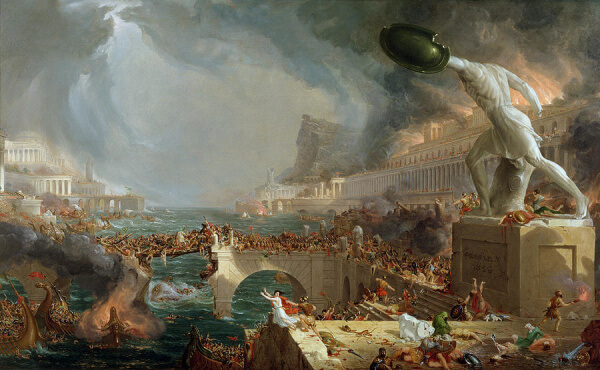What are the top AP European History textbooks and prep books?
The Ultimate Guide to the Best AP European History Textbooks and Prep Books
By Thomasina Lester
Updated: July 11, 2024
Are you preparing for the AP European History exam? Whether you’re self-studying or supplementing your coursework, textbooks and prep books are indispensable tools. With countless options on the market, choosing the right resource can feel overwhelming. This guide is here to help you find the perfect fit for your study needs, complete with expert recommendations, insights, and detailed reviews.
Why Textbooks and Prep Books Matter for AP European History
The AP European History exam requires in-depth knowledge of European history from the Renaissance to the present day, along with analytical skills to interpret primary sources, make comparisons, and construct arguments. Textbooks provide a structured and comprehensive overview, while prep books focus on exam strategies and condensed content. Here’s a breakdown of their key advantages:
Benefits of Using a Textbook
Comprehensive Coverage: Textbooks dive deep into the subject, offering thorough explanations of historical events and themes.
Supplemental Activities: They include activities like practice questions, essay prompts, and timelines to enhance understanding.
Durability: Textbooks can be reused for general reference or future academic pursuits.
Downsides of Textbooks
Cost: High-quality textbooks can be expensive, often exceeding $100.
Complexity: They may be difficult to navigate under a time crunch.
Benefits of Using a Prep Book
Affordability: Most prep books cost between $10 and $25.
Focused Content: They distill the most essential information in an accessible format.
Practice-Oriented: Prep books feature exam-style questions and full-length practice tests.
Downsides of Prep Books
Lack of Depth: They often omit nuanced details necessary for advanced analysis.
Limited Scope: Prep books are better suited for review rather than in-depth learning.
Best AP European History Textbooks
If you want an all-encompassing resource, a textbook is your best bet. Below are the top textbooks widely recommended by educators and students alike:
1. A History of Europe in the Modern World: AP Edition
Authors: R. R. Palmer, Joel Colton, Lloyd S. Kramer
Price: $149.99 (Amazon)
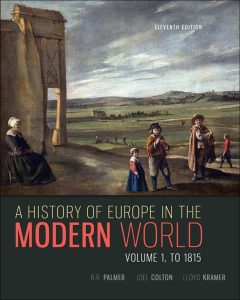
This textbook is a timeless classic that’s been updated to align with AP course requirements. Known for its rich narrative and detailed analysis, it’s an excellent choice for students who thrive on comprehensive content.
Why Choose It?
Deep historical insight with engaging storytelling.
Strong emphasis on cause-and-effect relationships.
Includes visuals, timelines, and primary source excerpts.
Cons:
Expensive.
Best suited for students who have ample time for thorough reading.
2. A History of Western Society for the AP Course
Authors: John P. McKay, Bennett D. Hill, John Buckler, et al.
Price: $146.89 (Amazon)
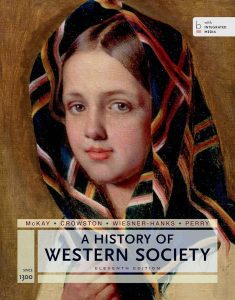
This textbook’s modular design breaks down complex topics into manageable sections, making it easier to digest. It’s widely used in classrooms for its practical approach and supplementary tools.
Why Choose It?
Includes focus questions, vocabulary, and guided activities.
Comprehensive yet approachable for high school students.
Cons:
Still on the pricier side.
3. Western Civilization
Author: Jackson J. Spielvogel
Price: $105.98 (Amazon)
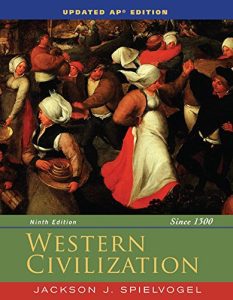
Spielvogel’s Western Civilization is a straightforward and affordable option that doesn’t compromise on quality. It’s particularly useful for self-studying students.
Why Choose It?
Concise yet detailed.
Budget-friendly compared to other textbooks.
Cons:
Fewer interactive features compared to others.
Best AP European History Prep Books
Prep books are perfect for students looking for targeted review and practice. Here are the most highly rated options:
1. 5 Steps to a 5: AP European History
Price: $12.29 (Amazon)
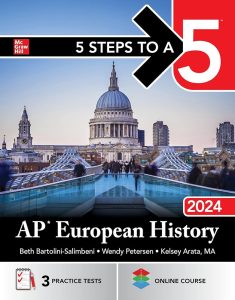
This structured prep book offers actionable steps to excel in AP European History. Its clear outline and comprehensive practice exams make it ideal for independent study.
Key Features:
Study plans tailored to your timeline.
Exam-style multiple-choice and essay questions.
Cons:
Lacks depth in historical context.
2. Achiever Exam Prep Guide for AP European History
Author: Christopher Freiler
Price: $26.99 (Amazon)
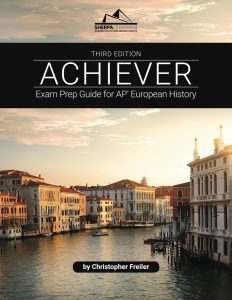
Written by an experienced AP teacher and exam reader, this prep book is a goldmine of insights and tips for acing the exam.
Key Features:
Covers key themes and concepts.
Provides exam-specific strategies.
Cons:
Pricier than other prep books.
3. AMSCO Advanced Placement European History
Price: $22.99 (Amazon)
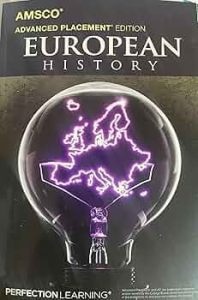
This hybrid of a textbook and prep book delivers the best of both worlds. It’s concise, easy to read, and includes practice questions tailored to the AP exam format.
Key Features:
Detailed content review.
Exam-focused practice questions.
Cons:
May not include full-length practice tests.
4. Barron’s AP European History
Price: $12.49 (Amazon)
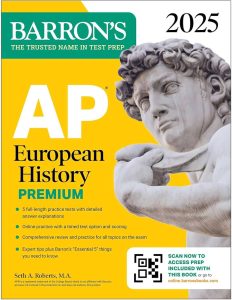
Known for its dense content, Barron’s prep book is a go-to for students seeking in-depth preparation.
Key Features:
Comprehensive review chapters.
Full-length practice exams.
Cons:
Can be overwhelming if you’re short on time.
5. The Princeton Review: Cracking the AP European History Exam
Price: $18.64 (Amazon)
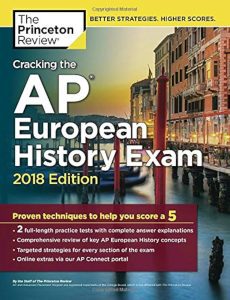
This classic prep book balances concise content review with strategic test-taking tips, making it a favorite among students.
Key Features:
Includes targeted strategies for multiple-choice and essay sections.
Practice tests for self-assessment.
Cons:
Limited depth compared to textbooks.
6. REA’s Crash Course for AP European History
Price: $11.79 (Amazon)

As its name suggests, this prep book is perfect for last-minute studying. It focuses on high-yield content and exam strategies.
Key Features:
Concise, to-the-point review.
Ideal for quick revision.
Cons:
Not suitable for comprehensive learning.
How to Choose the Right Resource
Assess Your Goals:
Are you looking for in-depth knowledge? Opt for a textbook.
Need a quick review? A prep book is your best bet.
Consider Your Budget:
Textbooks are more expensive but offer long-term value.
Prep books are affordable and practical for short-term use.
Understand Your Timeline:
Textbooks are better for year-long courses.
Prep books are great for last-minute or supplemental study.
Final Tips for AP European History Success
Combine Resources: Use textbooks for detailed study and prep books for targeted practice.
Practice Regularly: Take full-length practice tests to identify strengths and weaknesses.
Stay Organized: Create a study schedule to ensure consistent progress.
Seek Help: Don’t hesitate to ask teachers or peers for guidance.
Conclusion
Investing in the right study materials can make all the difference in your AP European History preparation. Whether you prefer the depth of textbooks or the efficiency of prep books, this guide has provided you with a comprehensive overview of the best resources available. Remember to supplement your studying with other tools like flashcards, trivia, and practice questions. Good luck on your AP journey!

